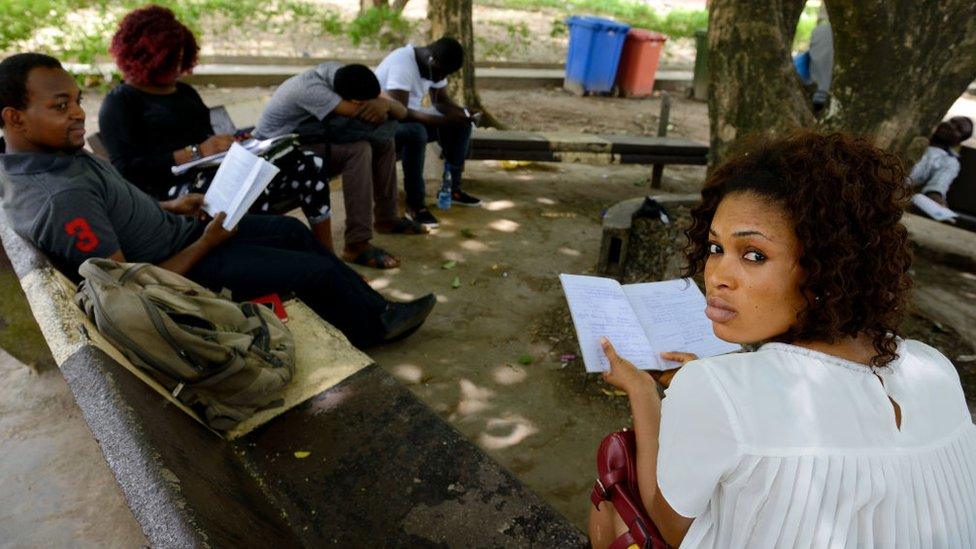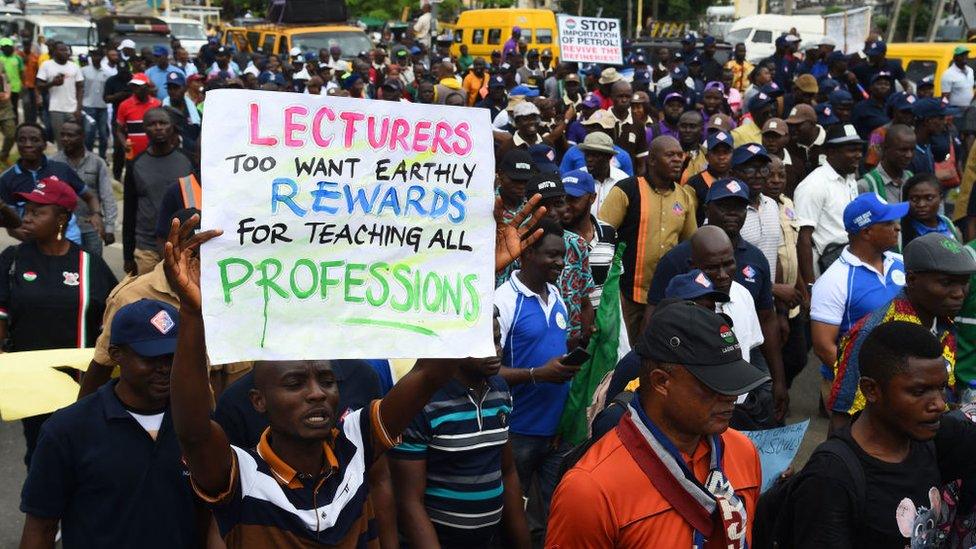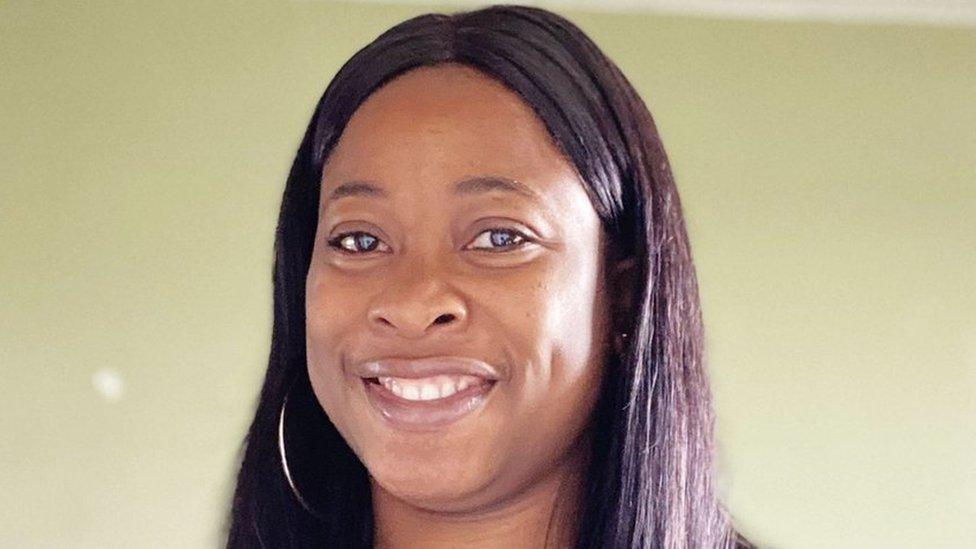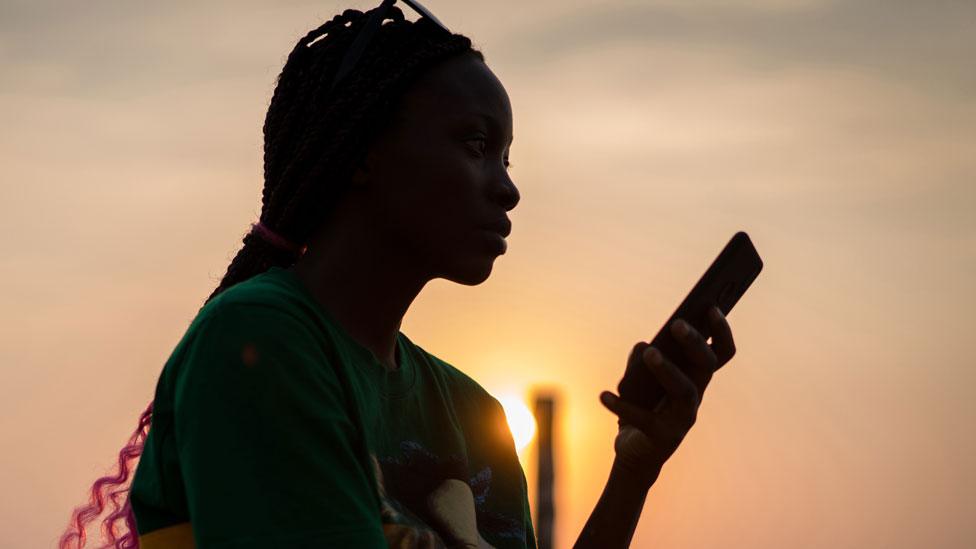Nigeria's Asuu university strike: 'Wasted eight months of my life'
- Published

Students in Nigeria's public universities schools tend to spend at least an extra year on four-year courses
Lecturers in Nigeria say they will go back to work on Monday after a strike that closed most of the country's universities for eight months, leaving hundreds of thousands of students angry and frustrated.
"That's eight months wasted out of my life, and what did the strike achieve?" asked one student who did not want to be identified.
The strike which began in February was the 9th in 13 years - the latest in a decades-long saga with the government about funding tertiary education in the country.
The main lecturers' union - the Academic Staff Union of Universities (Asuu) - has been fighting for improved funding but the government says it can't meet all its financial demands.
Asuu said it decided to call off the strike "as a law-abiding union and in deference to appeals" by Nigerians but that "issues remain unresolved".
The lecturers stopped work at public universities to support their demands, but the prolonged strikes have caused widespread disaffection among students and families.
"I did absolutely nothing in eight months," said another student, glad she was finally going back to school in Lagos.
"[People] keep saying learn a skill, learn a skill. If I wanted to learn a skill, I won't go to the university," she said.
It is not clear how the major sticking-point in negotiations since 2020 - the method of paying lecturers - was resolved, raising concerns that another strike may not be far off.
Lecturers were protesting about a government payroll system they said did not capture certain allowances and led to discrepancies in salaries.
The government, however, said the system helped it check the scourge of ghost-workers in the civil service and rejected an alternative payroll software developed by the lecturers as it did not pass its integrity tests.
A previous nine-month strike ended in December 2020 after the government signed an agreement to look into the issues raised by Asuu, but it apparently reneged, leading to several warnings by the union before members eventually downed tools in February this year.
Students who have now missed almost a full session of academic work, two years after a Covid-disrupted one, are now expected to resume classes on Monday and many are not pleased they will not be able to graduate when they ought to.
"My mates in private universities have graduated and now have a two years' start in life," said a student at the University of Port Harcourt.
The incessant strikes have eroded confidence in Nigeria's public tertiary education system, leaving people with the options of expensive private universities or migrating to countries with affordable tuition fees, such as in eastern Europe.
Negotiations between the union and the government often drag on but this year's talks were even more rancorous, with the government taking the union to court, whose order to resume was ignored by lecturers.
Children of many politicians, including those of President Muhammadu Buhari and senior professors, often attend school abroad, increasing frustrations that the government and universities' management are not invested in finding a solution to the crisis.

Nigeria First Lady Aisha Buhari posted this photo of her daughter's graduation in the UK
Last week, President Buhari announced that the government would invest 470bn naira ($1.1bn; £960m) in the universities next year as part of the agreement reached with the union, which will also see an increase in lecturers' pay.
But he warned that the government could not continue to finance tertiary education alone and that Nigeria needed to adopt successful models from other countries to fund the sector.
How to fund tertiary education has been a big problem for years in Nigeria where low tuition fees mean many can access public schools. However, this has come at the cost of low salaries to lecturers and insufficient investment in the sector.
Experts believe one solution would be to grant universities the autonomy to raise fees and attract funding. But in a country where many families are poor and there is a record population of out-of-school children, there are fears this could make matters worse.
The idea of a low-interest loan for students has been mooted in the past, but that was rejected by the lecturers.
"If we had accepted that students pay 1m naira (£2,000; $2,300) as school fees, they would have increased our pay easily and who would the public and the students blame? It is Asuu," its chairman Emmanuel Osodeke said last year.

Students blocked major roads in September to protest at the government's inability to reach a compromise with lecturers
Asuu also wants the government to stop the creation of new universities until it can fund the existing ones and to release the report of a panel that investigated the top management of universities, which the union accuses of corruption.
But many Nigerians feel the union is too quick to resort to strikes over its demands, and that some of them, such as telling their employer -the government - how to pay them, have gone too far.
The government has also registered two new lecturers' unions, one of which said it will "work to ensure that this country is not traumatised again by strike", to weaken the power and monopoly of Asuu.
It is a strategy that has been used to great effect in the past by the Nigerian government to break powerful unions and get them to negotiate separately.
If it keeps the universities open, it is one many students and their families would take, even if it does not address the underlying problems.
"I'm hoping this is the last strike I'll face till I graduate but I can only hope and pray," said one student in a text message.
"The so called Asuu lecturers may come some other time and say they don't like their present salary that they want increment, what will we do 🤷? Nothing," he added, using an emoji for helplessness.
Related topics
- Published24 January 2019

- Published31 August 2021

- Published18 June 2022
